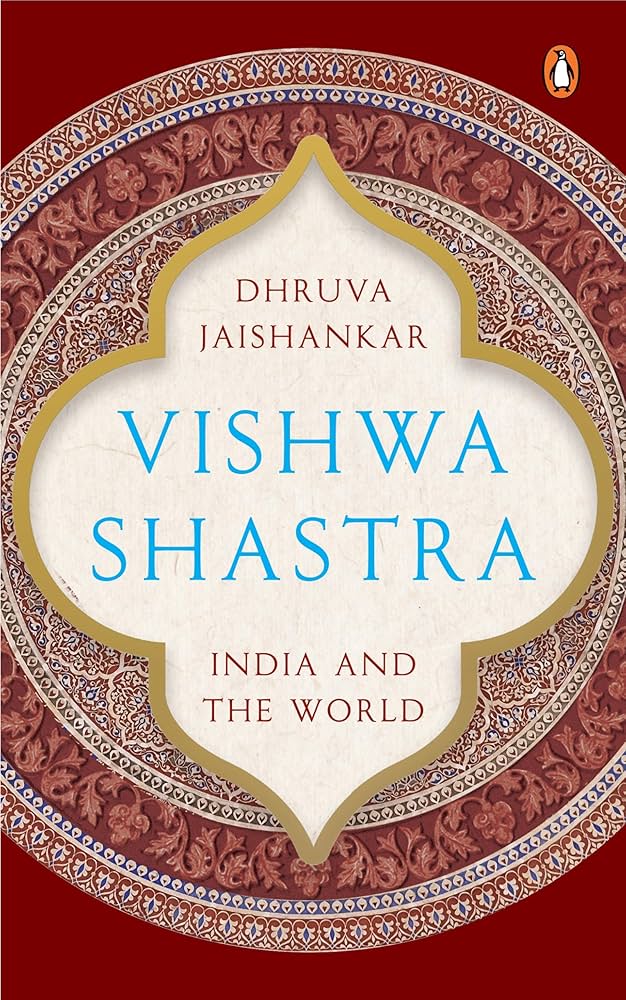(November 28, 2024) With striking similarities to his father, India’s External Affairs Minister S. Jaishankar, Dhruva Jaishankar carries a familial resemblance that’s hard to miss. Yet, when it comes to influences, Dhruva candidly admits that his grandfather, late Krishnaswamy Subrahmanyam—a renowned strategic affairs analyst, journalist, and former Indian civil servant—had a more profound impact on his worldview. “My grandfather was more of a thinker and analyst, whereas my father is more of a doer in active diplomacy,” he reflects, speaking to Global Indian from Washington, D.C., and crediting deep conversations with his grandfather for shaping his perspectives on international relations.
Today, as a foreign policy expert and the founding Executive Director of the Observer Research Foundation (ORF) America, a subsidiary of India’s ORF, he is working to build bridges between the U.S., India, and the developing world.
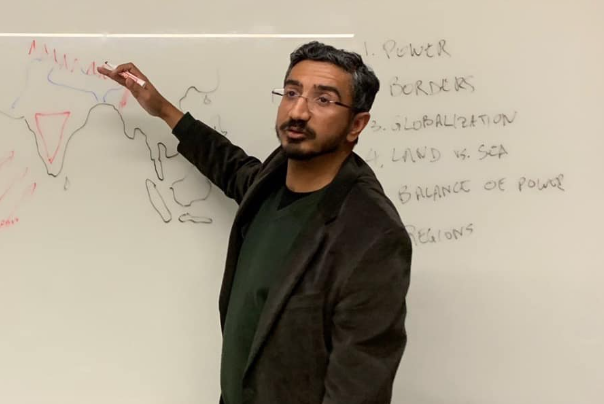
Dhruva Jaishankar
Dhruva is now gearing up for the release of his first book, Vishwa Shastra, published by Penguin Random House India. The book provides a comprehensive exploration of India’s interactions with the world, blending historical insights with forward-looking strategies. Dhruva’s research on foreign policy, defence, security, and globalization, has appeared in several books, policy reports, and prominent publications, cementing his reputation as a thought leader.
Influenced by a thinker
During his formative years, Dhruva Jaishankar lived a truly global life, moving across continents with his diplomat father—experiences that profoundly enriched his worldview. While Dhruva Jaishankar acknowledges the global exposure his father’s diplomatic career provided, he emphasizes the intellectual influence of his grandfather, Krishnaswamy Subrahmanyam. “My grandfather was opinionated analyst and eventually joined the defence think tank IDSA, where he became its second director until the mid-1980s. Later, he transitioned to a career in media, writing about strategic affairs. He passed away in 2011, but I was fortunate that our careers overlapped for a few years,” Dhruva recalls.
During this time, he engaged in deep conversations with his grandfather that shaped his analytical approach to international relations. “ My grandfather’s career in strategic affairs and his deep thinking on India’s role in the world had a lasting impact on me,” Dhruva reflects. These insights, paired with the global exposure his father’s career afforded him, helped Dhruva develop his own unique perspective on global affairs.
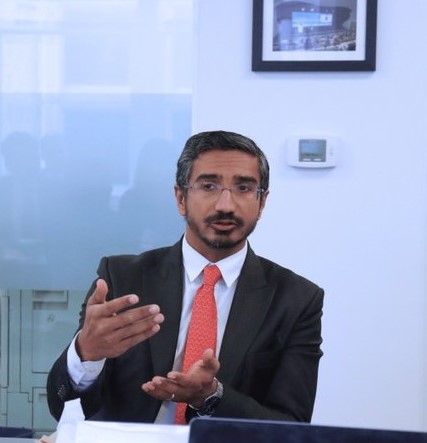
Dhruva Jaishankar
A global upbringing
Born in Delhi, Dhruva Jaishankar spent his childhood moving across several countries, including the U.S. (where he lived briefly at a very young age), Sri Lanka, Hungary, India, Japan, and the Czech Republic. He began his schooling in Sri Lanka and continued his education across these nations before eventually moving to the U.S. for college.
This global upbringing instilled in him a deep understanding and appreciation for different cultures—an experience that would later become the bedrock of his professional life.
The spark of a career
Dhruva Jaishankar’s interest in foreign policy deepened with a significant moment during his freshman year at Macalester College in the U.S., where he was pursuing his bachelor’s degree in history. “9/11 stirred a deep interest in security studies,” he recalls, “and laid the foundation for what would become my lifelong career in foreign policy and international relations.”
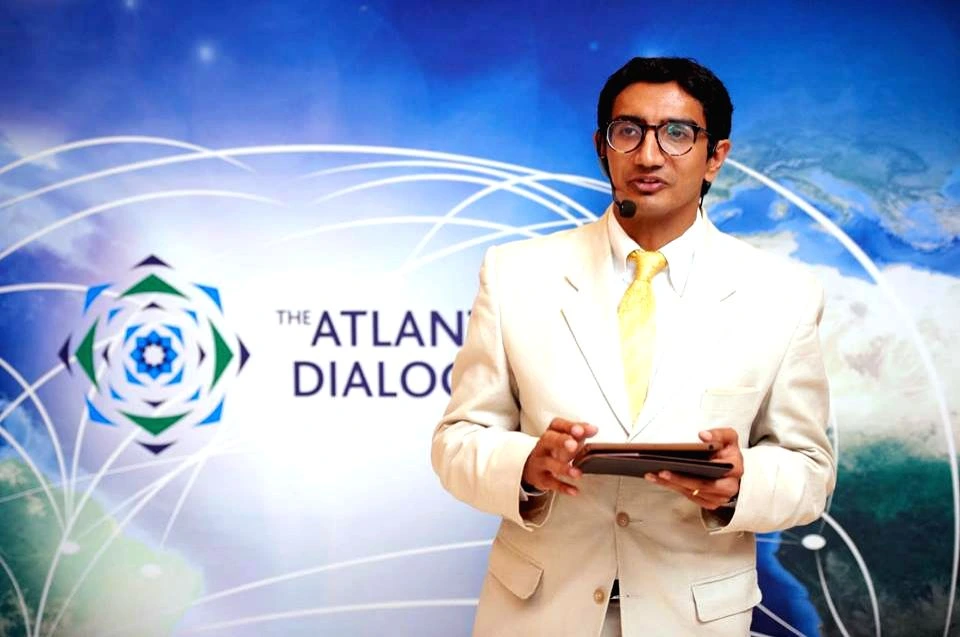
Dhruva Jaishankar during the early days of his career
After graduating in 2005, he moved to Washington, D.C., where an internship at the Aspen Institute proved to be a turning point. “After finishing college, I moved to Washington, DC, without a clear idea of what I wanted to do. I ended up getting an internship at a think tank, which plunged me into the heart of U.S.-India relations at a pivotal time, just as the two countries announced a civil nuclear agreement,” he explains.
Despite his grandfather’s legacy as a prominent Indian think tank leader, Dhruva admits he initially knew little about the field. “Although my grandfather had run a think tank in India, I didn’t know much about what the work entailed,” he smiles. “That internship turned out to be a huge learning experience for me. That was my introduction to this world.”
Choosing international relations over journalism
Early in his career, Dhruva faced a crossroads: should he pursue journalism or follow his growing interest in international relations? He briefly explored journalism, working as a news writer and reporter for CNN-IBN in New Delhi.
Ultimately, his passion for security and foreign policy won out. He pursued an M.A. in security studies from Georgetown University, where he was surrounded by military and security professionals. Initially feeling like an outsider, Dhruva Jaishankar credits this environment with building his confidence to engage in high-level discussions on global security, a skill that would become invaluable in his career.
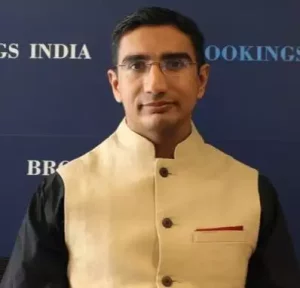
Dhruva Jaishankar during the early days of his career in India
Being Global Indian: Bridging local and international realities
Working for prestigious organizations including Stephen Cohen as research assistant, and German Marshall Fund (GMF) in Washington, D.C., where he managed the India Trilateral Forum, a policy dialogue involving participants from India, Europe, and the United States, deepened his understanding of security and foreign policy. He also worked as a program officer with GMF’s Asia Program for the initial three years in the organization.
Dhruva returned to India in 2016 to work as a Fellow for Brookings India. This role marked a deep dive into India’s foreign affairs, counterterrorism, and nuclear non-proliferation. “At Brookings India I managed a lot of the new institution’s foreign policy and security activity. It enabled me to travel the length and breadth of India, around South Asia (Nepal, Bangladesh, Sri Lanka) and Southeast Asia, and I produced reports on defence technology, U.S.-India relations, and India’s Act East policy,” he shares. Later, he also served as a visiting fellow at the S. Rajaratnam School of International Studies in Singapore.
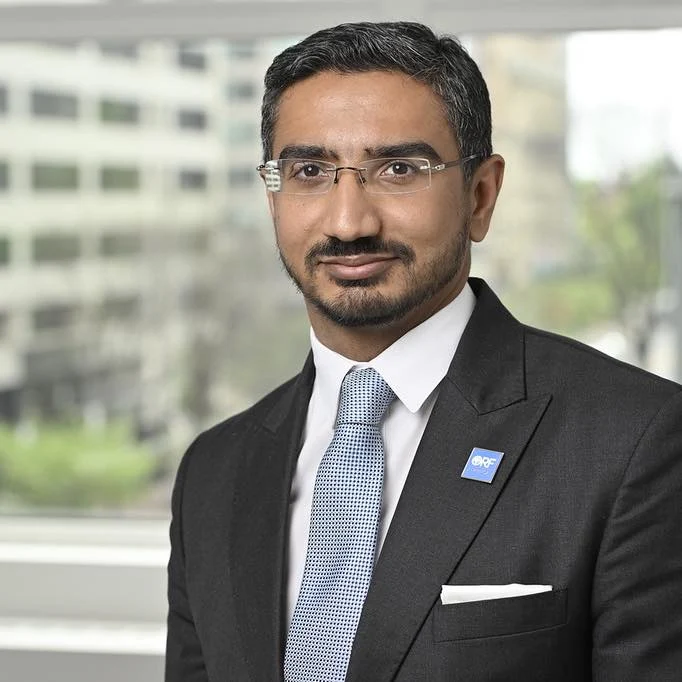
Dhruva Jaishankar
Building ORF America
“Over the course of my 15-year career, I worked in diverse roles across various institutions in India, the U.S., and briefly in Singapore. This experience exposed me to a wide range of issues, regions, and the practical aspects of running a think tank,” he shares. In 2020, Dhruva embarked on a new journey as the founding Executive Director of ORF America, the Washington, D.C.-based arm of India’s Observer Research Foundation, which began its journey in 1990.
In 2020, ORF was planning to establish its first affiliate outside India in the U.S. “Our paths crossed,” Dhruva explains, and his experience in think tanks made him a natural fit for the role. This led to him becoming the founding Executive Director of ORF America, marking a significant milestone in his career.
He and his team at ORF America has focused on fostering cooperation between the U.S., India, and other global partners on pressing issues like technology policy, energy, climate, and international security.
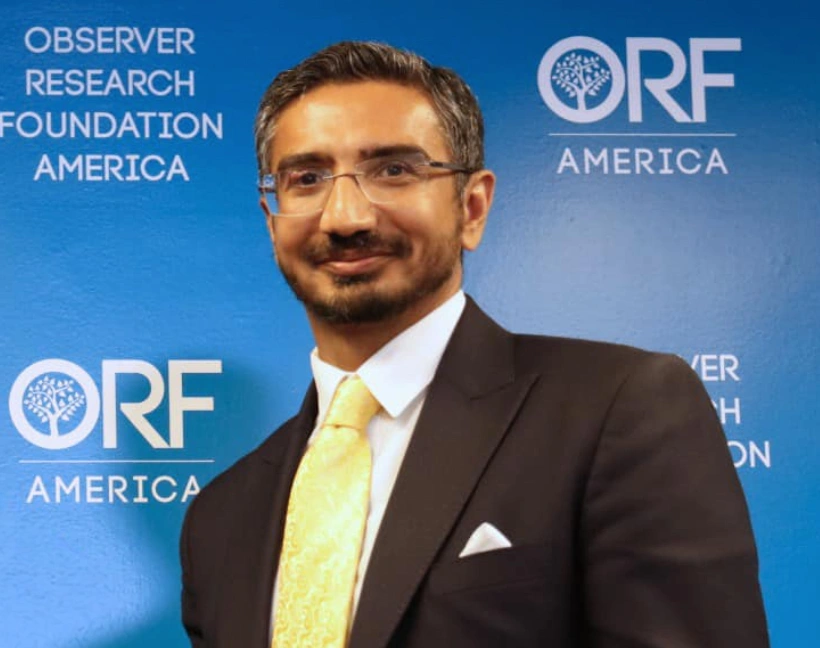
Dhruva Jaishankar
Bridging the developed and developing worlds
“What differentiates ORF America from a lot of other think tanks in Washington is the focus on bridging the developed and developing worlds on various global issues,” Dhruva explains. Under his leadership, the organization has launched several ambitious projects.
At ORF America, we conduct research on U.S.-India relations, U.S. alliances and partnerships, and Global North-Global South engagement. We also convene topical roundtables in Washington and conferences around the world, including in India, Europe, Africa, the Middle East, and Latin America. Finally, we organize leadership development programs, including on climate and energy issues, China, and AI policy,” he mentions.
ORF America collaborates closely with ORF’s three centres in India—Delhi, Mumbai, and Kolkata—as well as its Middle East branch in Dubai. “We collaborate closely and work together on various projects,” Dhruva says, highlighting the organization’s unified approach.
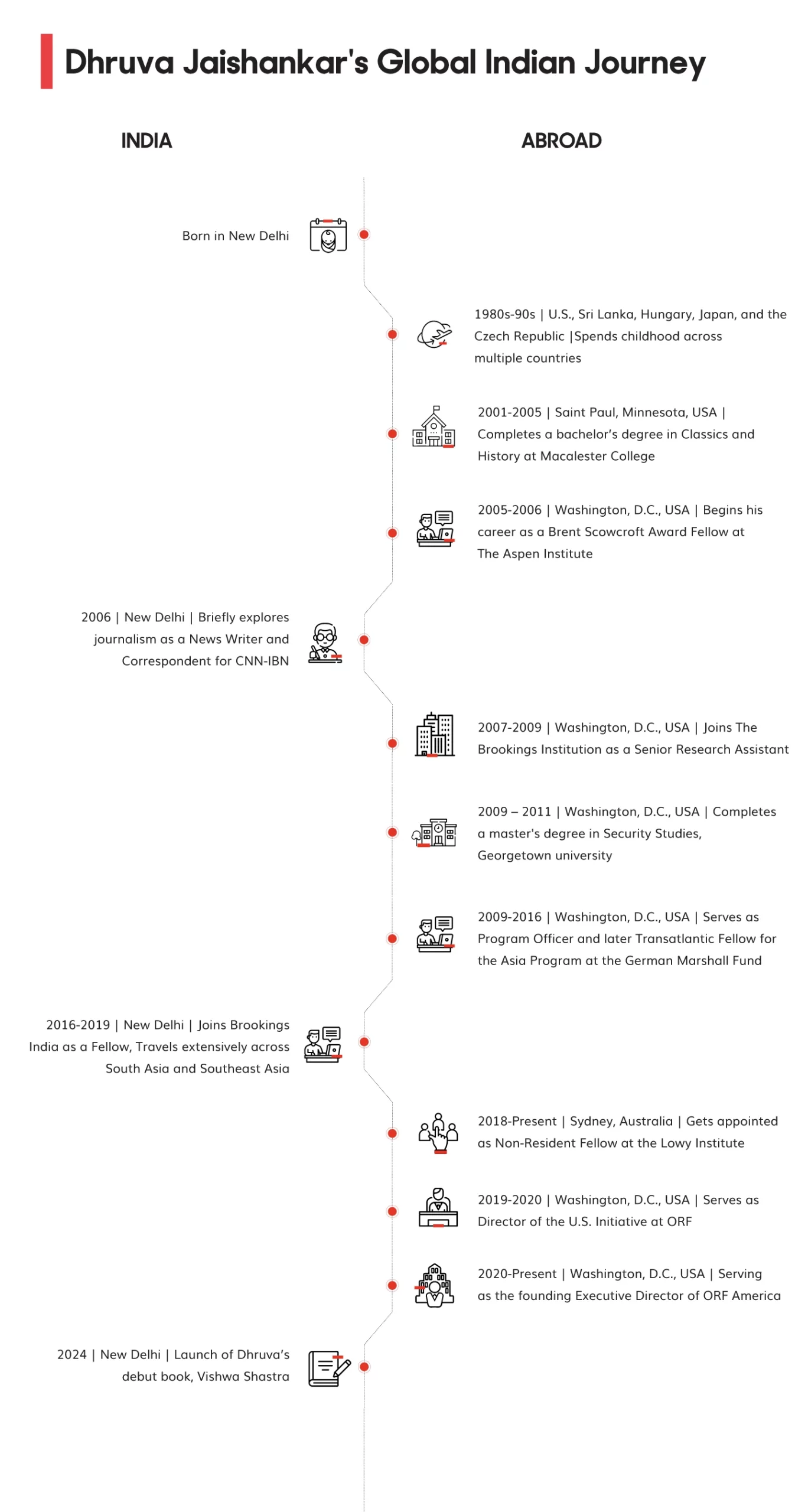
Matters of the heart
Married to an American historian, Dhruva started his family in Delhi before moving to the U.S. “We keep personal and professional life separate,” says the devoted father of two children, ages seven and four. Although he travels frequently for work, he makes an effort to spend quality time with them. He enjoys cooking for his kids and being with them during this stage of their lives, as they grow and learn new things. “Outside of work, I spend most of my time being a father,” he smiles.
Enjoying life in America, the Global Indian remains deeply connected to his native country, with its capital, Delhi, holding special significance in his journey. He was born in the city, returned at age nine, and later moved back twice as an adult. “In fact, I started my family there, and my first child was born in Delhi,” he shares.
Vishwa Shastra: India and the World
Dhruva Jaishankar is excited about the next milestone in his journey—the release of his debut book, Vishwa Shastra, published by Penguin Random House India. The book offers a comprehensive exploration of India’s historical and strategic role on the global stage.
“One big motivator for me,” Dhruva shares, “was the many talks and presentations I gave to student audiences across India, while I was working there between 2016-2019. Students from diverse backgrounds—not just social sciences but also law and engineering—showed a deep curiosity about India, its international relations, and its history. I realized there wasn’t a good book that offered a comprehensive starting point to understand India’s interactions with the world.”
He added, “My primary goal in writing this book was to create a foundation, especially for young Indians, but also for anyone interested, to learn more about India and its international relations.”
The book delves into India’s ancient connections with regions spanning the Mediterranean to Asia, the enduring impact of colonialism, and the country’s post-Independence challenges, including its rivalries with Pakistan and China. It provides a framework for understanding India’s evolving geopolitical landscape while presenting forward-looking strategies. The second part of the book addresses five critical challenges: leveraging the economic environment for growth, integrating with neighbouring countries, balancing relations with a rising China, combating terrorism, and advocating institutional reforms in global governance.
Renowned writer and politician Shashi Tharoor has endorsed Vishwa Shastra, calling it, “An impressive tour d’horizon spanning centuries of India’s strategic thought, traditions of statecraft, and contemporary foreign policy.”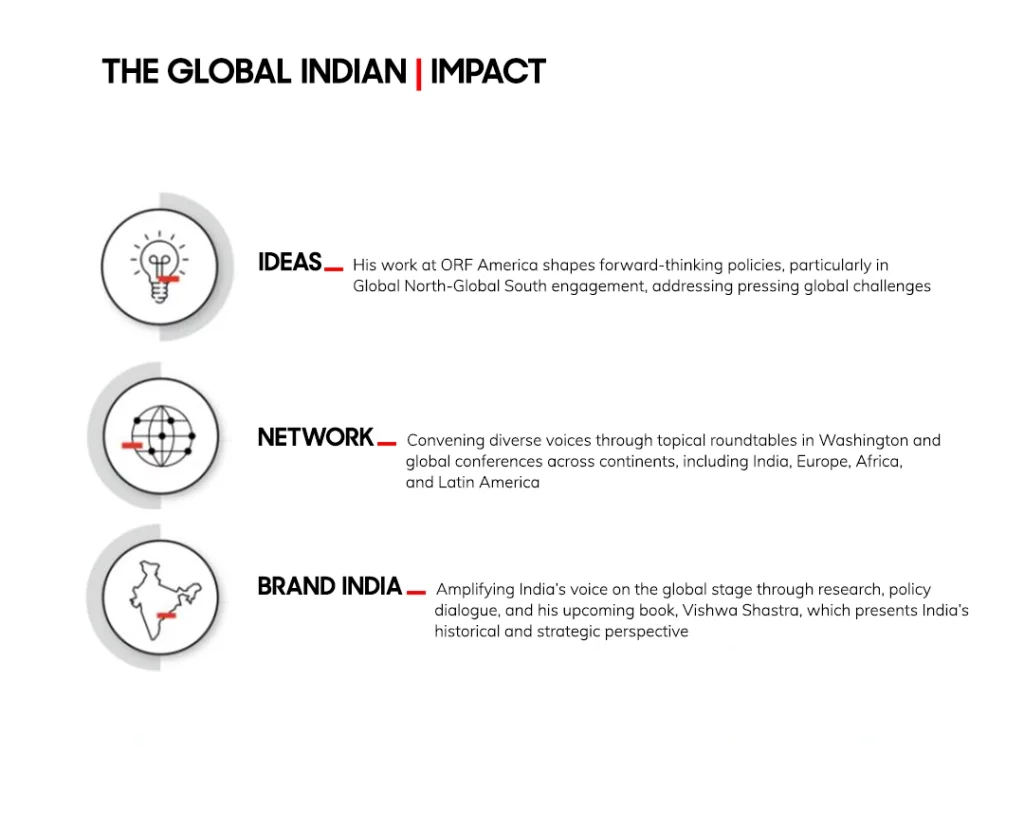
The enduring bond with his roots continues to inspire Dhruva Jaishankar’s work. While influenced by his family’s legacy, Dhruva Jaishankar’s journey is defined by his own vision—one that aims to elevate India’s role in an interconnected world, bridging continents and generations alike. With his first book, Vishwa Shastra, he hopes to further this mission and contribute to a deeper understanding of India’s place in the global arena.
- Follow Dhruva Jaishankar on LinkedIn


